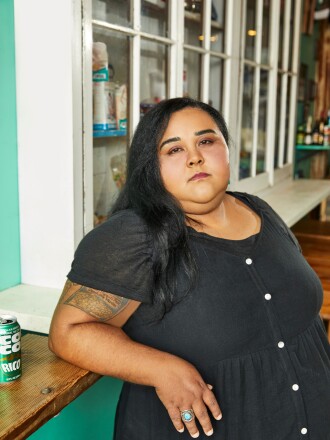Buy Now → Diasporican: A Puerto Rican Cookbook, $30, Bookshop.org
Award-winning food writer Illyanna Maisonet’s Diasporican is the very first book of its kind: It details and documents the cuisine of the Puerto Rican diaspora living in the United States (who are 5.5 million strong) with more than 90 recipes. Part memoir, part historical account, and part cookbook, Diasporican covers the breadth and depth of the diversity of Puerto Rican cuisine in a down-to-earth, no-nonsense way. It’s a refreshing, informative read: Maisonet has no time for romantic flourishes or to debate the intricacies of what makes an empanadilla—it’s time to cook.

Raised in Sacramento, Maisonet now calls the Bay Area home.
Photo by Gabriela Hasbun
Puerto Rican food has always been near and dear to Maisonet’s heart, who grew up preparing food in the kitchen with her grandmother during her childhood in Sacramento. Now based in the Bay Area, she’s made it her professional mission to cover the cuisine in her work whether it be with her San Francisco Chronicle column, Cocina Boricua, or the many articles that she’s written for publications like Bon Appétit, Saveur, and the Los Angeles Times.
Her cookbook (set to be released Tuesday, October 18) is a sort of a magnum opus that encapsulates her life’s work. It’s a cookbook that Masionet feels is long overdue. “Over the last five decades, there are only maybe 10 Puerto Rican cookbooks that have been traditionally published, none of which have been written by someone not born on the island,” Maisonet said in an email interview. “Puerto Rico is a colony of the United States. You can fly to Puerto Rico right now on a domestic flight and without a passport. It both is and is not part of the U.S. Yet more people know about jerk chicken than mofongo.”
Through her work and Diasporican, Maisonet tries to answer the seemingly simple question “What exactly is Puerto Rican food?” With the island’s long colonial history, many cultures have influenced modern Puerto Rican cuisine, including the Spanish, enslaved African people who were brought to the island, and the Indigenous Taino populations. It is at once all of these things and not exactly any of them.

Diasporican runs the breadth of Puerto Rican cuisine, from fried foods to dessert.
Courtesy of Penguin Random House
Diasporican is also an exploration of Puerto Rican food as Maisonet knows it—California Puerto Rican food, or “Cali-Rican” food, as she puts it. These are dishes near and dear to her heart that she’s cooked—and eaten—all of her life. Some of her favorites in the book include Arroz con Gandules (which she considers to be the national dish of the island), Carne Guisada (great for those new to Puerto Rican cooking), and Mami’s Mushroom Chicken (her favorite dish she ate growing up). Diasporican artfully balances historic anecdotes with personal narratives, and Maisonet’s signature, matter-of-fact way of storytelling makes for some poignant—and funny—moments in the book: For example, in the techniques chapter, there’s a section titled “Washing Rice and Why the 2:1 Ratio Is Bullshit.”
However, Maisonet makes it clear that she’s not writing a book on “real” (whatever that means, right?) Puerto Rican food. Rather, Diasporican is a celebration of California Puerto Rican food and a celebration of the resiliency of “the tribe of Ni De Aquí, Ni De Allá” (not from here, not from there)—people like Maisonet.
“Me and [other] Puerto Rican cookbook authors are all just working with what we have to leave our own stepping stones across the water,” Maisonet said. “The next generation can use it to make it across and further the story of Puerto Rican food.”











